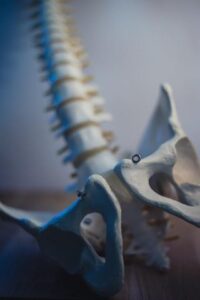
Cervical & Pelvic Health Month: How Physical Therapy Supports Pain Relief and Function
Cervical and pelvic health are crucial to overall well-being, yet they are often under-discussed. Many individuals experience discomfort or dysfunction in these areas, which can

Breaking the Cycle of Pain: Treatment Options for Vaginismus
Vaginismus is a condition that many women face yet often don’t talk about. It involves involuntary muscle spasms that make any form of vaginal penetration,

How Orgasm Improves Postpartum Pelvic Floor Function
Learn How Orgasm Improves Postpartum Pelvic Floor Function Try a naturally occurring strengthening method Many factors come into play when considering resuming to sexual activity

Barriers to Restoring Sexual Function After Childbirth
Why Sexual Function After Childbirth Can Be a Challenge Disclaimer: This blog post is based on research performed on cis-gendered women Many women are told

Postpartum Sexuality & Mood Changes in Women with Pelvic Girdle Pain
Does my pelvic girdle pain have anything to do with my mood and sexuality? Many of our patients experience sexual dysfunction and anxiety, depression and

Vulvovaginal Moisturizers: Who Needs One & Choosing the Right One
Choosing the Right Vulvovaginal Moisturizer Assuming you need one, make sure it’s got the right ingredient list There are many reasons why those born with

Participate in a High Quality Study Using Shockwave Therapy for Painful Intercourse
Learn about low intensity shockwave therapy for painful intercourse (dyspareunia) Our team at Femina Physical Therapy is committed to providing the highest level of evidence-based

Painful Sex: The (Actual) Mind-Body Connection
Exploring the Mind-Body Connection to Painful Sex Pain during sex isn’t in your head… but it can ‘get into your head’. The medical community recently had

The Effects of Pelvic Floor Muscle Strength on Orgasm
Let’s Look at the Effects of Pelvic Floor Muscle Strength on Orgasm Hint: strong pelvic floor muscles = strong orgasm The world is learning more

The Link Between Deep Infiltrating Endometriosis and Sexual Function
What is Endometriosis and Deep Infiltrating Endometriosis? Endometriosis is a benign condition where endometrial tissue (the lining of the inside of the uterus) grows outside

Endometriosis and Sexual Function: A Multidisciplinary Approach to Sex without Pain
Endometriosis and Sexual Function Require a Specialized Approach Endometriosis is a global disease affecting 5-15% of women during their reproductive years. It is characterized by

What Do We Know About Contraceptives and Sexual Function?
Contraceptives and Sexual Function Considered As pelvic floor physical therapists, we work with a lot of women who have some type of female sexual dysfunction,

Physical Therapy Can Help Endometriosis and Painful Sex
Did You Know Physical Therapy Can Help Endometriosis? What is the link between endometriosis and painful sex? Endometriosis is a global disease affecting 5-15% of

Eating Disorders and Pelvic Floor Dysfunction | ED Awareness Week
What’s the Connection Bewteen Eating Disorders and Pelvic Floor Dysfunction? Read on for some answers. Eating disorders are unfortunately common, with at least 9% of

Cervical Cancer and Recovery | A Pelvic Physical Therapist’s Guide
A Pelvic Floor PT Can Assist With Cervical Cancer and Recovery Cervical cancer is the fourth most common cancer affecting women worldwide. Luckily there are

What is IC and What Are The Symptoms? | Interstitial Cystitis
What is IC or Interstitial cystitis? IC is also known as bladder pain syndrome or painful bladder syndrome and is a debilitating condition that significantly affects

Mental Health and Sexual Pain: Having Sexual Pain Is Not In Your Head
Mental Health and Sexual Pain: Sexual Dysfunction is Not “In Your Head”. We have seen that experiencing sexual pain CAN affect your mental health, and

How Chronic Stress Affects Your Sex Life and How To Address It
You may have heard that chronic stress takes a toll on your body. But did you know how chronic stress affects your sex life? What

Can A Vaginal Birth Ruin Your Sex Life? | Femina PT Talks Postpartum Sex
Are You Wondering “Can A Vaginal Birth Ruin Your Sex Life?” Medically, the answer is a resounding ‘no’… but postpartum sex is still an understandable

Sexual Health Awareness Month | Safe Sex During Covid-19
Whether you’re asking for a friend or for yourself, it’s an important question these days. Practicing social distancing and wearing a mask can make it

Lasers And My Vagina?!?
Lasers And My Vagina – Do They Really Belong Together? A Breakdown of common Energy Based Devices Marketed for your Vagina Risks and Possible Benefits

Foam Roller Refresh for a New Year
Here’s a simple foam roller routine to try for a happier pelvic floor this new year. Foam rolling is a fantastic way to manage pelvic

Persistent Genital Arousal Disorder (PGAD) | What is it and How Can Pelvic Floor Therapy Help?
Persistent Genital Arousal Disorder (PGAD) is a condition that is poorly understood. Persistent Genital Arousal Disorder is a rare disorder most commonly seen in those

Benefits of Manual Therapy for the Pelvic Floor
Manual Therapy Skills are an Often Overlooked Aspect of Physical Therapy In is well documented in journals such as the International Urogynecology Journal and Harvard

